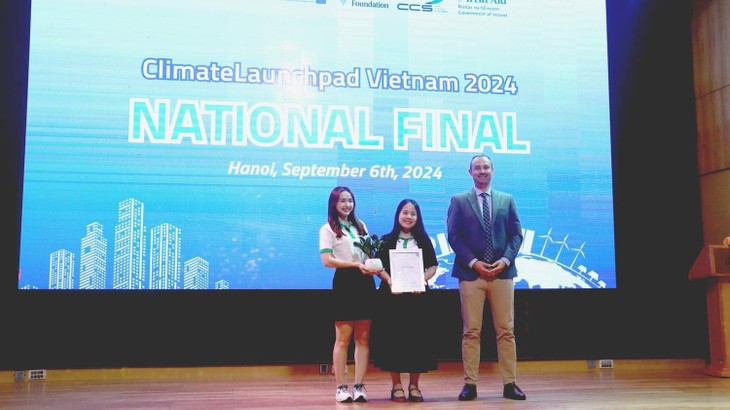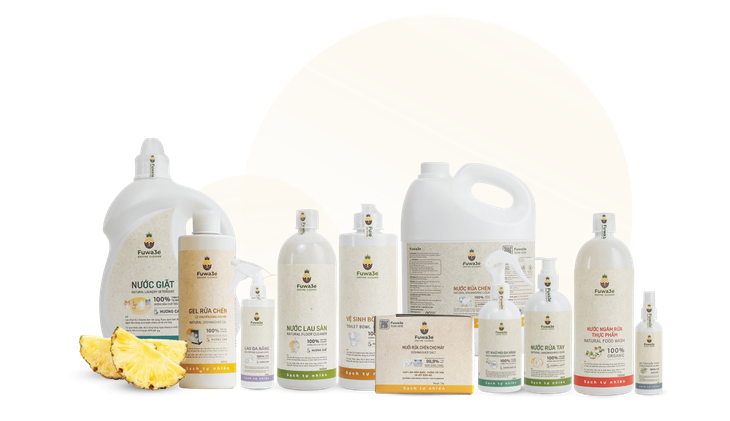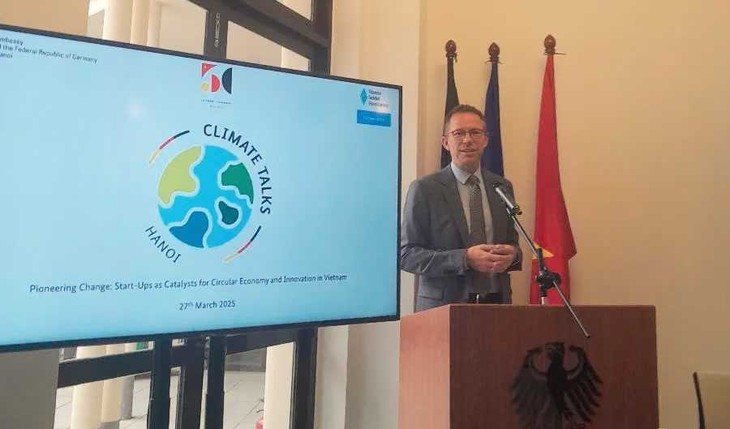(VOVWORLD) - The concept of a circular economy, which emphasizes the reuse, recycling, and refurbishment of products and materials to minimize waste, is gaining momentum across Vietnam. At the heart of this transformation are Vietnam’s startup companies, whose innovative solutions and bold business models are playing a key role in driving the shift towards a more sustainable future.
 AirX Carbon's NetZero Pallet, a pallet made from agricultural waste, wins the top prize at the ClimateLaunchpad Vietnam 2024 competition. (Photo credit: AirX Carbon Facebook) AirX Carbon's NetZero Pallet, a pallet made from agricultural waste, wins the top prize at the ClimateLaunchpad Vietnam 2024 competition. (Photo credit: AirX Carbon Facebook)
|
HCMC-based AirX Carbon is developing carbon-negative materials by transforming agricultural by-products such as coffee grounds, rice husks, and coconut husks into sustainable alternatives to conventional plastics. NetZero Pallet is one of AirX Carbon’s outstanding products, said Hoang Dieu My, the company’s Strategic Manager.
AirX Carbon has three breakthroughs. First is technology in biomaterials and natural adhesives. Up to 96% of components in our pallet products are agricultural by-products. The rest are natural adhesives which decompose easily. The company has done R&D to give the final pallet products the same load capacity as traditional pallets and resistance to termites, mold, and moisture.
The second breakthrough is the mold technology, which is suitable for FDI companies that have automated factories or many robots. Third, AirX Carbon has a closed cycle from design to assembly to factory completion and we’re ready to scale or expand to any other location. “With these breakthroughs, we can produce sustainable products and lower the production cost to compete with wooden pallets,” My concluded.
This is one of the inspiring stories AirX Carbon shared at a workshop, held in Hanoi last week by the German Embassy to Vietnam, that highlighted the role of startups as catalysts for the circular economy and innovation in Vietnam.
With rapid urbanization and an increase in consumption, waste management has become a tough challenge for Vietnam. Startups are stepping up by introducing advanced recycling systems, turning waste into bioenergy, raw materials for new products, and consumer goods. FUWA Biotech Company, for example, uses pineapple peels to produce biological enzyme cleaning solutions.
 FUWA products (Photo credit: fuwa.com.vn) FUWA products (Photo credit: fuwa.com.vn)
|
Tran Thi Thanh, co-founder of FUWA Biotech, said the company’s products are among the top biological cleaning products in Vietnam. "The first breakthrough is using raw materials. Every day our factory collects for recycling thousands of tons of pineapple peels discarded in Thanh Hóa province, one of Vietnam's largest pineapple producing regions. Pineapples contain the enzyme bromelain, which is highly effective in cleaning,” Thanh told VOV.
“The technology FUWA uses is eco-enzymes to create cleaning products without chemicals. Almost 99% of our products are made from natural ingredients. By combining pineapple enzymes and native Vietnamese essential oils, the fragrance of FUWA's cleaning products is entirely from the essential oils instead of synthetic chemical fragrances.”
As a result, FUWA products are completely safe for people with eczema, dermatitis, or sensitive noses, or even pregnant women. They also save water because their viscosity is only one-third that of regular products. The wastewater is environmentally friendly because FUWA products discharge beneficial microorganisms into the water," according to Thanh.
Startups are also tackling the food waste issue, with some businesses focusing on turning food waste into compost or even creating new food products from discarded ingredients. These new business models not only help reduce waste, but also promote sustainability as a core value among consumers.
In addition to technology-driven solutions, many startups are creating new ways for consumers to engage with products, moving away from the idea of "buy, use, dispose" and instead offering “repair, reuse, or share” options.
One of the key challenges of a circular economy is a lack of demand for recycled products. But startups in Vietnam are working to change that by building new markets for upcycled and recycled goods. Whether it's eco-friendly packaging, recycled furniture, or everyday products made from waste materials, these businesses are creating demand for products that would otherwise be discarded.
While the impact of these startups is significant, challenges remain. Vietnam’s circular economy ecosystem is still in its infancy, and many of these businesses face obstacles such as limited access to funding, regulatory hurdles, and the lack of infrastructure for widespread recycling and waste management.
Nguyen Hong Long, Director of the Center for Creativity and Sustainability, stressed the need of a support mechanism. “There’s clearer and stronger support from the government for circular startups through new policies and incentives,” said Long, adding, “Although cooperation and connectivity have been set up between research institutes and experts inside and outside the country, a mechanism is needed to help startups access that. A support mechanism is, I think, what circular startups need most right now.”
The international community is watching Vietnam closely, and there is growing interest in Vietnam’s circular economy potential, according to Simon Kreye, Deputy Head of the German Embassy in Hanoi.
 Simon Kreye, Deputy Head of the German Embassy, speaks at the 5th workshop of the Hanoi Climate Dialogue themed "Pioneering change: Startups as catalysts for circular economy and innovation in Vietnam" (Photo: Huong Giang) Simon Kreye, Deputy Head of the German Embassy, speaks at the 5th workshop of the Hanoi Climate Dialogue themed "Pioneering change: Startups as catalysts for circular economy and innovation in Vietnam" (Photo: Huong Giang)
|
The German diplomat said, "The innovative drive and entrepreneurial spirit here in Vietnam are clearly visible and are something we’re all excited about. We’re also excited to continue collaborating with local startups, businesses, and the government in realizing the full potential of the circular economy in Vietnam.”
“Startups are leading the way, but it takes all of us, the government, companies, businesses, and civil society working together to make a lasting impact. The journey toward a digital circular economy is really a shared one, so let's continue to work together toward that common goal,” said Simon Kreye.
By prioritizing reuse, recycling, and responsible consumption, startups in Vietnam are more than just business innovators. They are the drivers of change in the national journey toward a circular economy, showing that sustainability can be both profitable and transformative.